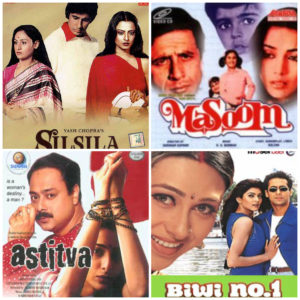 In an industry progressively endorsing its belief in the equality of the two sexes, it is interesting to see Hindi cinema’s age old and often naïve and stereotypical take on adultery. Primarily, it often seems that we refuse to accept that it is not just the men who may find the grass greener on the other side. Women may also look beyond their husbands for reasons best known to them. From Biwi No. 1 to Masoom, most films show the man seething and fuming as soon as he sees the woman with another man, forget acknowledging that she may have actually sought pleasure elsewhere.
In an industry progressively endorsing its belief in the equality of the two sexes, it is interesting to see Hindi cinema’s age old and often naïve and stereotypical take on adultery. Primarily, it often seems that we refuse to accept that it is not just the men who may find the grass greener on the other side. Women may also look beyond their husbands for reasons best known to them. From Biwi No. 1 to Masoom, most films show the man seething and fuming as soon as he sees the woman with another man, forget acknowledging that she may have actually sought pleasure elsewhere.
Of course, you have an occasional Astitva. And we are grateful for that. Then there is Kabhi Alvida Na Kehna where the woman was portrayed as irrational to the core. Apart from these exceptions, takes on adultery have focused steadfastly on the tendency of only the man to stray.
Let us not even go into the banal comedies of the world. Films like Masti, No Entry and Shaadi No. 1 would have you believe that men are nothing but hormone stricken animals. They have needs that wives cannot satisfy at all. And that a man has zero commitment and control. Also problematic is the way adultery is ‘dealt with’ by females in Hindi films; either with resignation or acceptance (Gharwali Baharwali) or by simply demonizing the other woman (Biwi No. 1). Some women are desperately lacking a mature, self-respecting approach towards unfaithful men.
Masoom is a film loved for several reasons. It is raw innocence. The unabashed, gut wrenching reality of it all is powerful. But it disturbs one to realize that even an actress like Shabana Azmi would agree to play a woman who accepts an illegitimate child for no other reason except that the individual within her refuses to stand up to the unconditionally loving wife and mother. The woman ultimately acknowledges that her existence revolves around her family. She can’t see those bonds break. In a key sequence in the film, Tanuja, a smoking, working, (and consequently independent) woman comes running to Azmi to tell her that her estranged husband has ‘called her back’ and that she can’t wait to be home with her son. If that isn’t undermining your own self, what is? Shouldn’t the husband be at least rendering a proper apology instead of just inviting her back home or ‘allowing’ her to come back? This is the same woman, who had, earlier in the film, delivered a monologue to Azmi on standing up for oneself.
Yes, family matters infinitely. And probably the most. But a rational film on adultery should give a few more reasons for accepting an illegitimate child. There should be a slightly more logical, convincing explanation of how family accepts your faults. Mainly because you will accept theirs too. And that is the kind of understanding you share. And that is what the relationship should be based on. Not a certain helplessness where you undermine your own individuality.
There are thus two issues with the portrayal of adultery in Hindi cinema currently. One where we assume that in life it is restricted to males. And two that females deal with it only in particular ways. A saner, more mature understanding is necessary. Just like relationships aren’t made or broken in a day, people and their complexities need not be painted in such black and white hues. There is so much more to explore and so much we are ready for as audience.

About the Author
Lata Jha is currently a student of journalism at Columbia University. She has written for numerous web platforms on a wide range of issues as both volunteer and intern. She aspires to pursue a career primarily in film journalism, though she is equally vocal about issues in other spheres of life that she may feel strongly for. Connect with her on Twitter